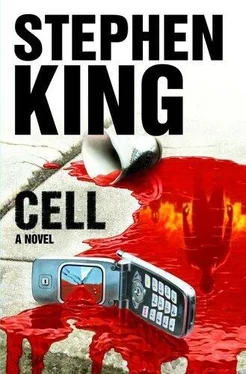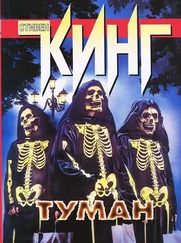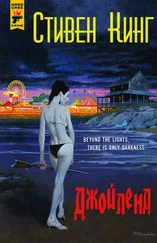"Also," Jordan said, "the big sprayers in there are all full of weed-killer or plant-food or something. We'd have to start by dumping them all out, and that would mean putting on masks just to make sure we didn't gas ourselves or something."
"Reality bites," Alice said morosely. She looked at her baby sneaker for a moment, then tucked it away in her pocket.
Jordan picked up the keys they had matched to one of the maintenance pickups. "We could drive downtown," he said. "There's a Trustworthy Hardware. They must have sprayers."
Tom shook his head. "It's over a mile and the main drag's full of wrecks and abandoned vehicles. We might be able to get around some, but not all. And driving over the lawns is out of the question. The houses are just too close together. There are reasons everybody's on foot." They had seen a few people on bicycles, but not many; even the ones equipped with lights were dangerous if ridden at any speed.
"Would it be possible for a light truck to negotiate the side streets?" the Head asked.
Clay said, "We could explore the possibility tomorrow night, I suppose. Scout out a path in advance, on foot, then come back for the truck." He considered. "They'd probably have all sorts of hose in a hardware store, too."
"You don't sound exactly jazzed," Alice said.
Clay sighed. "It doesn't take much to block little streets. We'd end up doing a lot of donkey-work even if we got luckier than we did tonight. I just don't know. Maybe it'll look better to me after some rest."
"Of course it will," the Head agreed, but he sounded hollow. "To all of us."
"What about the gas station across from the school?" Jordan asked without much hope.
"What gas station?" Alice asked.
"He's talking about the Citgo," the Head replied. "Same problem, Jordan—plenty of gasoline in the tanks under the pumps, but no power. And I doubt if they have much in the way of containers beyond a few two– or five-gallon gasoline cans. I really think—" But he didn't say what he really thought. He broke off. "What is it, Clay?"
Clay was remembering the trio ahead of them limping past that gas station, one of the men with an arm around the woman's waist. "Academy Grove Citgo," he said. "That's the name, isn't it?"
"Yes—"
"But they didn't just sell gasoline, I think." He didn't just think, he knew. Because of the two trucks parked on the side. He had seen them and hadn't thought anything of them. Not then, he hadn't. No reason to.
"I don't know what you—" the Head began, then stopped. His eyes met Clay's. His eroded teeth once more made their appearance in that singularly pitiless smile. "Oh," he said. "Oh. Oh my. Oh my, yes."
Tom was looking between them with mounting perplexity. So was Alice. Jordan merely waited.
"Would you mind telling the rest of us what you two are communing about?" Tom asked.
Clay was ready to—he already saw clearly how it would work, and it was too good not to share—when the music from Tonney Field died away. It didn't click off, as it usually did when they woke up in the morning; it went in a kind of swoop, as if someone had just kicked the source down an elevator shaft.
"They're up early," Jordan said in a low voice.
Tom gripped Clay's forearm. "It's not the same," he said. "And one of those damned ghetto blasters is still playing . . . I can hear it, very faint."
The wind was strong, and Clay knew it was blowing from the direction of the soccer field because of the ripe smells it carried: decaying food, decaying flesh, hundreds of unwashed bodies. It also carried the ghostly sound of Lawrence Welk and his Champagne Music Makers playing "Baby Elephant Walk."
Then, from somewhere to the northwest—maybe ten miles away, maybe thirty, it was hard to tell how far the wind might have carried it—came a spectral, somehow mothlike moaning sound. There was silence . . . silence . . . and then the not-waking, not-sleeping creatures on the Tonney soccer field answered in kind. Their moan was much louder, a hollow, belling ghost-groan that rose toward the black and starry sky.
Alice had covered her mouth. The baby sneaker jutted upward from her hands. Her eyes bulged on either side of it. Jordan had thrown his arms around the Head's waist and buried his face against the old man's side.
"Look, Clay!" Tom said. He got to his feet and tottered toward the grassy aisle between the two shattered greenhouses, pointing at the sky as he went. "Do you see? My God, do you see?"
To the northwest, from where the distant groan had risen, a reddish orange glow had bloomed on the horizon. It strengthened as he watched, the wind bore that terrible sound again . . . and once more it was answered with a similar but much louder groan from Tonney Field.
Alice joined them, then the Head, walking with his arm around Jordan's shoulders.
"What's over there?" Clay asked, pointing toward the glow. It had already begun to wane again.
"It might be Glen's Falls," the Headmaster said. "Or it might be Littleton."
"Wherever it is, there's shrimp on the barbie," Tom said. "They're burning. And our bunch knows. They heard."
"Or felt," Alice said. She shuddered, then straightened and bared her teeth. "I hope they did!"
As if in answer, there was another groan from Tonney Field: many voices raised as one in a cry of sympathy and—perhaps—shared agony. The one boombox—it was the master, Clay assumed, the one with an actual compact disc in it—continued to play. Ten minutes later, the others joined in once more. The music—it now was "Close to You," by The Carpenters—swooped up, just as it had previously swooped down. By then Headmaster Ardai, limping noticeably on his cane, had led them back to Cheatham Lodge. Not long after that, the music stopped again . . . but this time it simply clicked off, as it had the previous morning. From far away, carried across God alone knew how many miles by the wind, came the faint pop of a gunshot. Then the world was eerily and completely silent, waiting for the dark to give place to the day.
19
As the sun began to spoke its first red rays through the trees on the eastern horizon, they watched the phone-crazies once again begin leaving the soccer field in close-order patterns, headed for downtown Gaiten and the surrounding neighborhoods. They fanned out as they went, headed downhill toward Academy Avenue as if nothing untoward had happened near the end of the night. But Clay didn't trust that. He thought they had better do their business at the Citgo station quickly, today, if they intended to do it at all. Going out in the daylight might mean shooting some of them, but as long as they only moved en masse at the beginning and end of the day, he was willing to take that risk.
They watched what Alice called "the dawn of the dead" from the dining room. Afterward, Tom and the Head went into the kitchen. Clay found them sitting at the table in a bar of sunshine and drinking tepid coffee. Before Clay could begin explaining what he wanted to do later in the day, Jordan touched his wrist.
"Some of the crazies are still there," he said. And, in a lower voice: "I went to school with some of them."
Tom said, "I thought they'd all be shopping Kmart by now, looking for Blue Light Specials."
"You better check it out," Alice said from the doorway. "I'm not sure it's another—what-would-you-call-it, developmental step forward, but it might be. It probably is."
"Sure it is," Jordan said gloomily.
The phone-crazies who had stayed behind—Clay thought it was a squad of about a hundred—were removing the dead from beneath the bleachers. At first they simply carried them off into the parking lot south of the field and behind a long low brick building. They came back empty-handed.
Читать дальше








